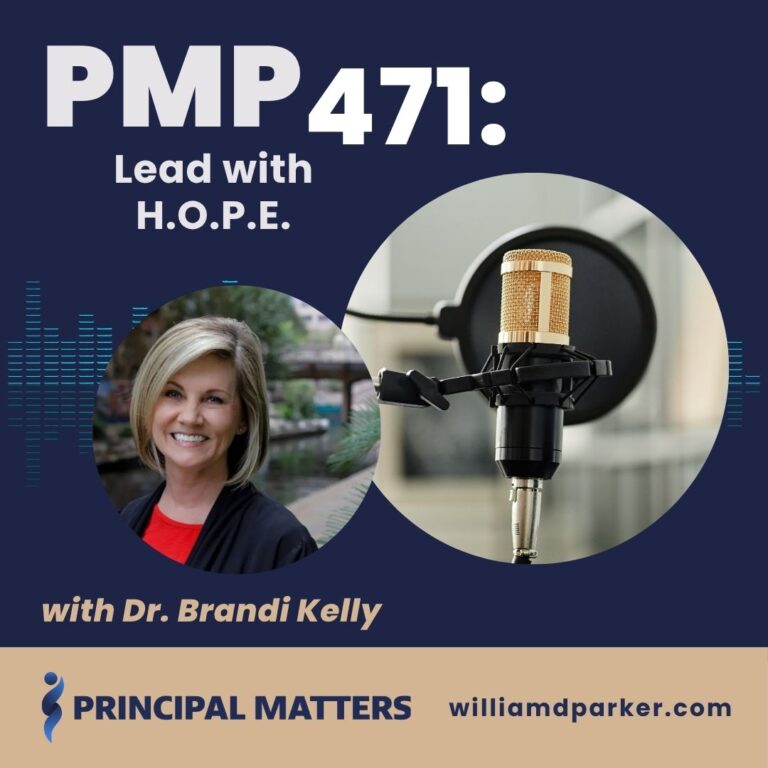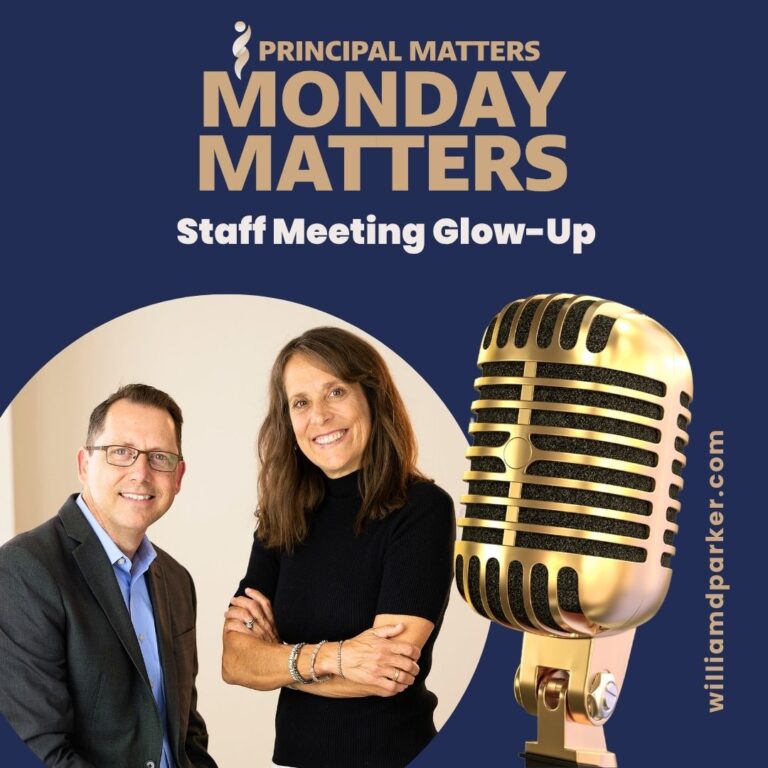Podcast: Play in new window | Download
I’m a frequent flyer. The more I fly, the harder I find it is to stay focused when flight attendants are reviewing safety procedures.

They could be standing right in front of me with the safety cards in hand, but I’ve heard it so many times, I usually think about something else.
On the other hand, I seem to pay more attention when the attendant says, “If the cabin loses air pressure, an oxygen mask will drop from above your seat. Place the oxygen mask on yourself first before assisting your child or other passengers.”
It’s always at this point, that I think about a hard conversation I had with my wife the second year I was in school administration. One night after the kids were in bed, my wife Missy asked if we could talk. I had just opened my laptop to read some work emails, so I slid it aside and said, “Sure. What’s up?”
“The kids and I have decided that you are a dad and husband on the weekends only.” She said without any bitterness or resentment in her voice. Just simple resignation. Then she looked me in the eyes. “Will, I think you are a shell of the man you used to be.”
It was difficult to listen because her words so accurately described my state-of-life. After eleven years as a classroom teacher, I had made the transition into the office as an assistant principal in a high school with 1,400 students. One of my goals was to be the kind of administrator I had admired and dreamed of having when I was a classroom teacher. I wanted to be the person who teachers and students could look to for answers, solutions, and support.
I woke up early every morning to check emails and plan out my day– hours before school began. I skipped lunches or ate quickly so that I could respond to emails or manage important situations. I supervised, observed, counseled, and evaluated. I attended after-school games and activities. And when I came home late each night, I’d fall asleep while trying to read bedtime stories to our four small children. When everyone was finally asleep, I’d stay up late to answer emails or plan for upcoming events or meetings.
In my new role in school leadership, I had stopped exercising. I had gained too much weight. Frankly, I was a shell of the man I had once been. Each day the pressure of serving students, teachers, and parents weighed so much on me that I didn’t think I could sacrifice time by less important to-do’s like eating right, exercising, or spending more time with my family time or in reflection.
My Letter of Resignation
When my wife went to bed the night of our important talk, I opened my laptop. Instead of working on email, I made a decision. I wrote a letter of resignation. I explained all the reasons I would need to leave my position, how my priorities were no longer correct, and how I had neglected my family and personal health. I printed the letter, put it in a file folder and took it my office the next morning.
When I sat down at my desk, I placed the folder on the corner where I could see it at all times. And I made a commitment: I’m either going to find a better way to serve my school while also caring for myself and my family, or I’m resigning and changing professions.
That day was a turning point for me. I didn’t discover a silver bullet. My pressures didn’t change either. Instead I found some longer lasting solutions. I began taking small steps toward making time for areas of my life: my family, my mind, my personal budget, my spiritual growth, and my physical health.
Over the days and years ahead, I made commitments to leave school earlier so I could be home for dinner. I started running again and working on fitness. I started eating lunch with colleagues and laughing more. And as a result, I discovered something: When you take time to invest in areas of your life outside of work, you find more creativity, inspiration and joy in serving others. In fact, I found my ability to connect with others, find solutions, and reach goals increase as I took time to take care of myself first.
Self-Reflection for Education Leaders
If you are leading a school, team or organization, let me ask you an important question: When is the last time you reflected on the foundational values, beliefs, and motivations for why you are serving others? Just like those airline attendants tell us when we fly: you can’t help others if you’re not first taking care of yourself.
One of the best ways to practice putting on your own air-mask is by giving yourself permission for self-reflection. Self-reflection allows you to focus on ideas and thoughts that you can turn into powerful actions that later become productive habits. And one powerful way to do that is by using images as a launching point. Just like thinking about an air-mask may help you to think about your need for self-care.
It may come as no surprise that most school leaders feel overwhelmed, overworked, and overcommitted. A leader’s job often involves putting out situational fires, responding to urgent needs, or satisfying the requests of a multitude of stakeholders. It’s no wonder that education leaders, in particular, must battle for time to enjoy the best parts of life and the best parts of their schools or organizations.
And research supports the claim that the work can be overwhelming. With the ever-increasing responsibilities of the school principal, for instance, it should be no surprise that in 2012, the Center for Public Education found that the average principal stays on the job for five years or fewer (Hull, 2012).
Self-Evaluation
When is the last time you had a heart-to-heart conversation about your own need for self-care? How would you answer these three questions as you reflect on your own current situation?
1. I find myself dedicating the majority of my work to areas that reflect my strengths and give me the greatest joy in work.
A. Strongly Agree
B. Agree
C. Sometimes
D. Disagree
E. Strongly Disagree
2. Because I invest in my own personal growth mentally, physically, spiritually, socially, and financially, I find fulfillment in my work as I do in my life outside of work.
A. Strongly Agree
B. Agree
C. Sometimes
D. Disagree
E. Strongly Disagree
3. If money or compensation were no longer necessary, I’d still want to do the work I’m currently doing.
A. Strongly Agree
B. Agree
C. Sometimes
D. Disagree
E. Strongly Disagree
Let me encourage you to take inventory of your self-care. Those whom you lead deserve a leader who is taking care of himself or herself. One way to do that is by considering you actions, applying the truths learned, and cultivating the most productive habits toward serving others.
If you’re going to help others, you must learn to first put on your own air mask.
Area 1: Your Learning (mindset, reading, development, conferences, conversations, experience)
Area 2: Your Body (nutrition, exercise, sleep, moderation, rest, creativity)
Area 3: Your Influence (mentoring, serving, teaching, leading others, platform building)
Area 4: Your Time (not wasting it, boundaries, scheduling what matters, tools, prioritizing)
Area 5: Your Friendships (accountability, life support, reflecting w/others, bringing out best)
Area 6: Your Spiritual Life or Moral Growth (faith, trust, Providence, community, hope, meaning)
Area 7: Your Resources (stewardship, debt, generosity, planning, budgeting)
Area 8: Your Intimacy or Loved One/Marriage (intimacy, commitment, beauty, joy, suffering)
Area 9: Your Future Leaders (children, students, presence, mindfulness, honesty, resilience, unconditional love)
Area 10: Your Legacy (perspective, goal-setting, letting go, giving back, paying forward)
Fast-forward
Seven years after our crucial conversation, my wife and I were ushering our kids into an elevator in Washington, D.C. As the doors opened on the third floor, we stepped out together into the lobby of a large hotel convention ballroom. I was wearing a tuxedo and my wife was in an evening dress. The girls were in Sunday dresses, and our six-year-old son was in a tie and vest. They had traveled with me as I was receiving an award from the National Association of Secondary School Principals for being Oklahoma’s State Assistant Principal of the Year.
As we spent the next few days touring the city, I remember thinking back to those first few years of school leadership. Life was still busy and overwhelming at times. But I had found a new rhythm in my work, life, and family for being more than a shell of the man I had once been.
Let’s Wrap This Up
I wish I could say that I consistently practice all the important areas required for personal growth. The truth is that over the years, I have grown stronger in some areas while neglecting others. Sometimes my wife and I still have crucial conversations about where I need to reprioritize my time and energy. But as you take time to reflect, instead of neglect, areas of personal growth, you can continuously refocus my time areas that need improvement.
After twenty-five years in the profession of education and fifteen in school leadership, would you let me share some of those lessons learned with you? That’s why Reflections for Education Leaders is so important. If you want to keep growing in your capacity to influence and serve others, you need time for reflection, learning, and taking action on your own personal growth. If your goal is to influence others in becoming future leaders, you can’t ignore this important safety notice: You need to learn to breathe first.
Now It’s Your Turn
Of the ten areas of growth, what is one area where you want to see personal growth? What is one area among the ten where you’ve already seen significant growth? Reach out to another school leader or email me at will@williamdparker.com and share one lesson you’ve learned from self-reflection in that area.
Sign-Up For Free Updates and Ebook
When you enter your email address below, you will automatically receive my newest posts and a free Ebook, 8 Hats: Essential Roles for School Leaders. Let’s keep learning together!
Subscribe for free weekly updates and receive free e-book!
(function($) {window.fnames = new Array(); window.ftypes = new Array();fnames[0]=’EMAIL’;ftypes[0]=’email’;fnames[1]=’FNAME’;ftypes[1]=’text’;fnames[2]=’LNAME’;ftypes[2]=’text’;}(jQuery));var $mcj = jQuery.noConflict(true);
Principal Matters–The Book!

School leaders are very busy, so each of the twenty-four chapters is designed as a quick-read and followed with take-action questions for follow-up or reflection. If you want practical ideas on understanding your purpose, managing school teams, dealing with challenges, and leading with courage, action, motivation, and teamwork, go HERE to pick up a copy for you or your team.
Messaging Matters

Harness the power of messaging to create a culture of acknowledgment, respect, and celebration. Written specially for leaders, this title is divided into three parts, helping readers to maximize their role as chief communicators with students, teachers, and parents and community. Each chapter includes suggestions for using digital tools to enhance messaging and ends with reflection questions and practical next steps.




